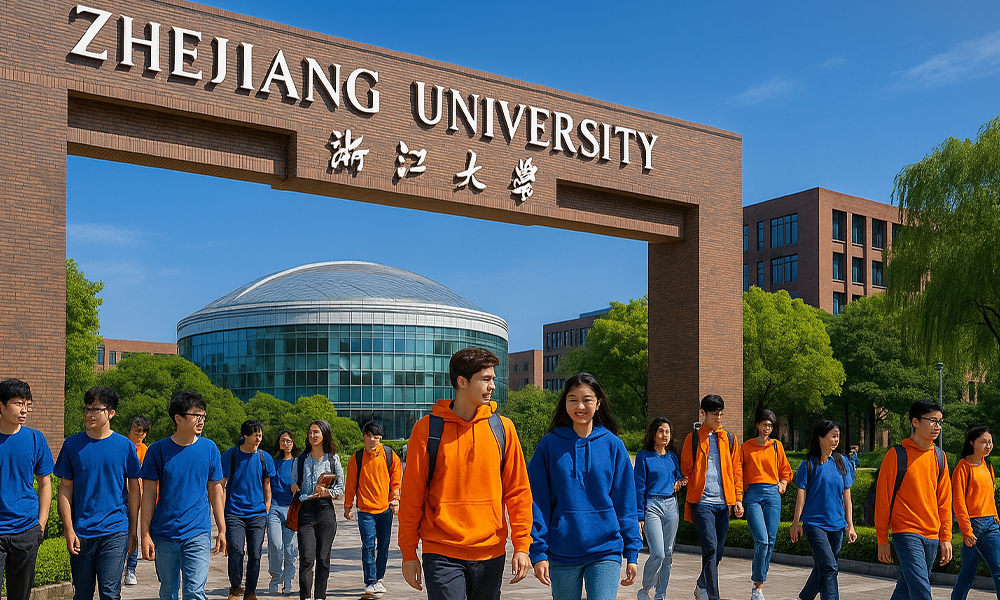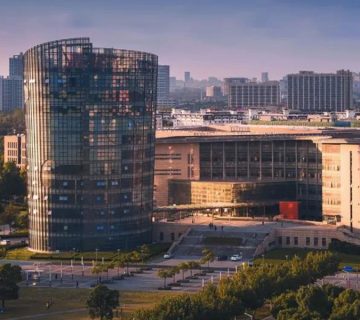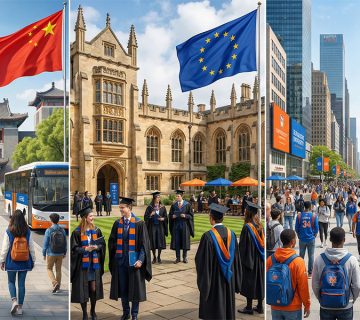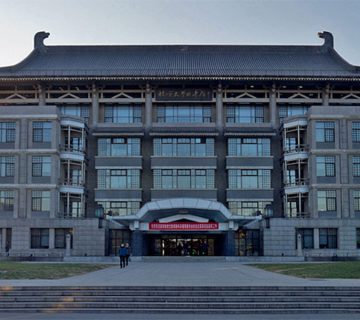Lies in Hangzhou’s picturesque city, renowned for its peaceful West Lake and booming silk heritage, Zhejiang University of Hangzhou is a center of scholarly excellence in China. Established in 1897, the institution has evolved from a modest engineering academy to a leading comprehensive university in the country. For international students seeking a study abroad experience, Zhejiang University offers a combination of groundbreaking research, profound cultural immersion, and global networking opportunities that can shape long-term professional careers. If you find yourself drawn to its cutting-edge engineering fields or its fledgling humanities programs, understanding the Zhejiang university of Hangzhou environment—majors to prices and admissions barriers—is essential. In this quest from admission institute, we will look at what makes this university the best option, drawing from its own sources to lead you along the path. This manual distills it, highlighting major factors such as Zhejiang university admission requirements and Zhejiang university tuition fees, in order to help empower your decision-making.
A Quick Look at Zhejiang University
| Category | Details |
| Popular Majors | Computer Science & Technology, Electrical Engineering, Medicine, International Business, Biotechnology, Chinese Language & Literature |
| Tuition Fees (Annual, RMB) | Undergrad: 21.000-42.000 ($2.900-$5.800), Graduates:26.000-50.000 ($3.600-6.900) |
| Living Costs (Monthly, RMB) | 2.000-3.000 ($280-$420) for food, transport and entertainment |
| Admission Requirements | Highschool diploma (undergrad), HSK 4-5/TOEFL 80+/IELTS 6.0+, transcript, recommendation letters |
| Scholarships | Chinese Government Scholarships(CSC), Zhejiang university scholarships (60-100% coverage) |
| World Rankings (2025) | QS: 47th /Times Higher Education: 42th, ARWU: 34th |
Updated 10/28/2025

Zhejiang University Majors
Zhejiang University’s courses are as diverse as the rich landscape that surrounds Hangzhou. There are over 140 majors in 12 broad areas of discipline, from hard sciences to creative arts. That diversity ensures that students, both fresh high school graduates or mature professionals seeking further qualifications, have courses that suit their interests and career aspirations.
1. Undergraduate
At the undergraduate level, Zhejiang University has its roots in core knowledge with strong interdisciplinary flavor. Engineering is placed front and center to reflect China’s push to industrialize. Take the College of Computer Science and Technology, for instance—its Bachelor of Engineering in Computer Science and Technology educates students in artificial intelligence, software development, and data analytics. Its alumni work in tech titans, creating innovations that reverberate in global markets. Likewise, the School of Medicine has a Bachelor of Medicine program that is challenging, pairing clinical training with biomedical research. Picture cutting up advanced human anatomies in cutting-edge laboratories and wondering about ethics in healthcare—it’s a program that sets you up to not only become a doctor but to spearhead medical innovation.
For business-minded students, the School of Management International Business undergraduate major is the way to go. Here, coursework blends global economics with Chinese market forces, featuring case studies on Hangzhou’s e-commerce explosion. Humanities lovers are not forgotten; the College of Humanities and Social Sciences offers a Bachelor of Arts in Chinese Language and Literature, diving into classical literature such as the poetry of Li Bai alongside modern digital narratives. Environmental science majors, however, deal with pressing issues like planning for sustainable city development under the College of Environmental and Resource Sciences, where fieldwork at the ecosystems of West Lake applies theory to reality.
2. Graduate
At graduate school, Zhejiang University ups the ante with master’s and doctoral degrees focused on research. The Graduate School oversees more than 300 special tracks. In engineering, the Master of Engineering in Electrical Engineering delves into renewable energy systems, of interest with China’s push for carbon neutrality. Biotechnology stands out in the School of Life Sciences, where PhD students might design new vaccines or examine genetic editing tools like CRISPR—work already leading to patents of international reputation.
School of Management’s master programs in business and economics include an MBA with fintech and supply chain management tracks aimed at Asia’s digital economy. Law students in the LLM in International Law program grapple with trade disputes under the WTO regime, often collaborating with faculty who advise on Belt and Road initiatives. Arts and design also thrive; the Academy of Design and Creativity offer an MFA in Industrial Design, where students create sustainable products based on Hangzhou’s tradition of craftsmanship.
3. Educational Excellence
What sets these majors apart is their global emphasis. Many offer English-language classes, especially at the international campus in Haining, fostering a cross-cultural classroom. Dual-degree partnerships with schools like the University of Illinois or Imperial College London allow seamless credit transfers, creating even more outlooks. The student testimonials are the strongest evidence of how such programs blend theory and practice—be internships in nearby Huawei labs or research assignments in Europe. With over 60,000 students, 7,000 of them international students, the university majors are not just enclosures on a brochure but portals to significant contribution to such fields shaping tomorrow’s world.
Short of it, choosing a major at Zhejiang University is choosing from a rich brocade of options that embrace tradition and invite innovation. Whether you’re coding up algorithms or cultivating crops for food security, the study here is less about learning—you’re leading.

Cost of Study in China
Study in China, particularly at a flagship university like Zhejiang University of Hangzhou, is unbeatable value compared to its Western equivalent, but it’s wise to break down the numbers. The overall cost of study in China is based on tuition, living expense, and ancillary fees, and Zhejiang university fees are a prime factor to consider by students working on a tight budget. Official estimates place annual expenditures in the range of 50,000 to 80,000 RMB (around $7,000 to $11,000 USD), making it affordable without compromising quality.
1. Tuition fees
Tuition comprises the bulk, varying by level of program and discipline. Undergrads can expect 21,000 to 42,000 RMB per year—science, technology, engineering, and math fields such as engineering or computer science will skew towards the higher side of the range depending on lab facilities, whereas humanities might drop lower. Graduate tuition comes next: master’s programs range from 26,000 to 50,000 RMB annually, while MBAs or concentrated engineering programs cost premiums for business relationships. PhD students typically receive their stipends or waivers through scholarships, making effective costs close to zero for highly qualified students.
2. Accommodation Fees
But tuition is merely the entrance fee. Lifestyle in Hangzhou adds on top—campus room prices 4,000 to 12,000 RMB annually for shared rooms, while private ones outside campus reach near 20,000 RMB in the city’s commercial districts. Food is a steal; university dining halls serve hearty fare for 10-20 RMB per meal, for 8,000-12,000 RMB annually if you fill in with street food like Hangzhou’s famous beggar’s chicken. Transport? A metro pass or a bicycle-sharing membership costs less than 2,000 RMB, having the campus area spread tightly.
3. Additional Expenses
The health insurance, mandatory for internationals, costs approximately 800 RMB per year on the university plan, covering basics at high-end hospitals. Texts and materials? Budget 2,000-3,000 RMB, with online materials readily available. Visa and processing fees are a one-time 1,000-2,000 RMB expense. To get the full picture, a bachelor’s degree in engineering might be 60,000 RMB in year one (tuition 30,000 + living 25,000 + miscellaneous 5,000), and this would fall as you take up part-time work or merit-based scholarships.
4. Scholarships
China’s value stems from government subsidies and a cost advantage—Zhejiang university tuition is 30-50% less than American publics, but campuses rival Ivy Leagues. Subsidized cultural outings and language courses are secret perks, packaged into the deal. Students typically report stretching the budget on the cheap: bargain hunting at markets for cheap vegetables or joining free hiking clubs around Lingyin Temple. But magnetism and inflation can cause prices to rise, so keeping an eye on exchange rates is necessary.
Ultimately, study in China at Zhejiang University is not a drawback—it’s a return that pays in skills, contacts, and perspectives that are borderless.

Hangzhou University Admission Requirements
Admission to Hangzhou University of Zhejiang is preparation-intensive, but the Hangzhou university application process is simple for internationals and merit-based, not mystery-filled. As a non-Chinese citizen with either a high school diploma (or equivalent) for undergraduate students or a bachelor’s degree for graduate students, you will enroll through the portal of the university, typically in September for fall entry.
1. Academic Requirements
Core academics are the highest priority: minimum GPA of 3.0/4.0 or 80% equivalent, supported by transcripts and recommendation letters. STEM applicants are stellar with math/physics scores; humanities students emphasize essays on cultural acumen. Language proficiency is critical—TOEFL 80+, IELTS 6.0 for English-taught programs, or HSK Level 4-5 for Chinese-taught programs. No HSK? Take bridge courses.
The process unfolds in phases: submit documents like passport, photos, and a 500-word personal statement by December-January deadlines. Entrance tests, like the university’s own for certain courses, test subject matter knowledge—think calculus for engineering students. Interviews, which may be online, test fit; work through answers on why Zhejiang and Hangzhou’s magic.
Financial documents—bank statements of 30,000 RMB coverage—and medical checkups are complete. Application fee: 800 RMB. Success rates are approximately 20-30% for internationals, in favor of diversified profiles. Alumni pro tips: tailor apps to research focus areas, e.g., ZJU’s AI labs, and use agents for visa facilitations.
Universalization of Hangzhou admissions releases a world where diligence and destiny converge.
Zhejiang University World Rankings
The ascent of Zhejiang University in world rankings is a testament to its strength, with 2025 rankings cementing its position as a top-tier institution. Ranked 42nd globally in general rankings by Times Higher Education World University Rankings 2025, it demonstrates balanced strengths in teaching, research, and globalization. This ranks it as China’s third-best, behind only Tsinghua and Peking, but leading in citations per faculty—a testament to its groundbreaking work in optics and materials science.
Shanghai Ranking’s ARWU 2024 (ongoing into 2025 previews) has it placed at 34th globally, excelling in natural sciences with four subjects within the world’s top 50. QS 2025 does the same at 47th, praising employer reputation as 90% of graduates get top-notch jobs within six months. By discipline, engineering stands at 19th in THE, biology at 34th—drives China’s innovation machine.
These peer and bibliometrics-based rankings highlight ZJU’s strength: 17 ESI top 1% disciplines, ranking second in China. For students, it’s credibility—your degree is worth something from Silicon Valley to Shenzhen.

Advantages of Studying at Zhejiang University
Zhejiang University’s allure is more than numbers; it’s the intangible advantages that truly draw you in. This university is one of the bests to study in Hangzhou universities. Intellectual rigor collides with real-world application—lively labs full of quantum computing research or simulations of sustainable cities preparing you for leadership, not just livelihoods. With 140+ global partners, and exchange semesters in Europe or co-authored theses with MIT affiliates broaden your horizons, making Hangzhou a launchpad. Culturally, being immersed in Hangzhou’s poetic beauty—strolling bamboo-lined paths or sipping Longjing tea—inspires toughness and imagination. Varied groups, 7% international, spark lifetime networks; alumni networks reach Fortune 500 boards. Financially, scholarships in China like the CSC cover 100% tuition for 2,000+ students every year, easing burdens. Professionally, 98% career placement rates and alumni ties with Alibaba, GE make internships translate into offers. Personally, the integrative philosophy—yoga clubs to TEDx talks—engages balanced spirits.
Conclusion
In short, learning here is not education; it’s transformation, integration of China’s ancient wisdom and visions of the future. Beyond classrooms, Hangzhou’s rich heritage and ZJU’s innovative culture foster lifelong skills, connections, and perspectives. With diverse majors, open Hangzhou university admission requirements, affordable Zhejiang university tuition fees, and brilliant world rankings, it equips students to thrive globally. For ambitious learners seeking value-based education in China’s thriving heart, Zhejiang University is not an option—it’s entry to a better future. Take the leap; your journey starts here. For additional information and expertise consultation, contact us.
FAQS:
1. What are the language requirements for admission to Zhejiang University?
International students who apply for English-medium courses need TOEFL 80+ or IELTS 6.0+. Chinese-medium courses need HSK Level 4–5. If you do not meet the threshold at the moment, preparatory language courses can be offered.
2. How much are Zhejiang University tuition fees for international students?
Undergraduate tuition ranges from 21,000 to 42,000 RMB annually, and master’s courses cost 26,000 to 50,000 RMB per year. PhD students are typically offered full scholarships. Hangzhou living costs are around 25,000–35,000 RMB per year.
3. What scholarships are available at Zhejiang University?
Head options are the Chinese Government Scholarship (CSC), which pays tuition, accommodation, and stipend for more than 2,000 international students every year. University merit-based scholarships and provincial scholarships are also plentiful.





No comment